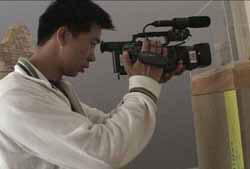This article was originally published by the USC School of Cinematic Arts on June 05, 2006
by James Tella, Communications and Public Relations
Summer has proven a busy time for six men and women from the School of Cinema & Television at the Communication University of China (CUC) who have spent the past five weeks working one-on-one with six USC counterparts to produce a series of short documentaries on the Chinese community in Los Angeles.
Their work, which culminated with a screening session last summer, encompasses a broad range of subjects. Among the topics are: the City of Angels as a melting pot; the lives of Chinese-American stunt doubles; how Chinese in Los Angeles have embraced Christianity, soccer and baseball as metaphors for integration; how Asians are changing the community landscape of Arcadia; and a history of Chinatown and the 1871 massacre.
The idea for the program began two summers ago, when Film & Television Production Professor Mark Harris and Critical Studies Professor Marsha Kinder were invited to Beijing and the CUC for a talk on documentary films forum. Both professors were struck by how much the Chinese had embraced the digital era and immediately were interested in forming a joint venture with the university.
“It’s an opportunity for the Chinese to see the city and also a way for the Americans to look at Los Angeles through different eyes,” said Harris who matched the Chinese and American students based on their common interests. “My biggest goal is that with their different approaches to filmmaking, all the students will enrich one another.”
CUC Professor and Director of the Art Department Guan Ling, who is also the leader of the workshop program, agrees with Harris. “In our country, we don’t have the same issues that are facing Los Angeles,” she said. “I’m confident that the documentary topics being filmed will prove to be fresh and interesting not only to the CUC students, but everyone in China.”
One of Guan’s objectives is to also prepare CUC students for China’s burgeoning cinematic arts market. With companies such as Time Warner, Warner Bros. and WorldCom in the economy mix, she wants to ensure that her university stays on the forefront of supplying the best talent to the industry.
Guan’s colleague, Cai Wei, chair of the documentary program at CUC and the associate professor who has accompanied Ling to Los Angeles, notes that since their university is the premier school in China for film and television talent, the exchange program with USC was a perfect fit. “We’re also very interested in learning how your production process works,” she noted.
While the intense timeframe of the workshop left little time for introductions, the students have thrived as teams, which Harris lightheartedly calls, “a marriage without divorce” because the partners couldn’t separate once they were assigned to one another. By the end of the first week they knew what films they were going to make and by week two they were already looking at beginning cuts. “LA is such a city of contrasts that it’s a wonderful place to make films,” added Harris, who admits that even he is enjoying the opportunity to learn new things about the city.
“It’s my first time in America, and I thought this was important to do,” said CUC student Tao Chang, who in a university with a student body of about 6,000, was one of over 200 candidates who competed for the six workshop slots. “We are very focused on producing the film and I love this kind of approach to sharing ideas and telling people what you think. It’s very helpful.”
Initially, Tao’s idea focused on Asian retirement in American nursing homes, however given the condensed production schedule for the project and the amount of red tape involved in acquiring filming permissions, the topic proved too overwhelming. Instead, his film focuses on the Southland’s melting pot of cultures.
“We’re not the only ones who started some place and ended up somewhere completely different,” said Tao’s USC partner, second-year production graduate student Krishnan Unnikrishnan, who was drawn to the project because he knew little about Chinese culture. He praised the workshop’s integration of students from all of the school’s divisions. “I’m making new friends and seeing how different people with different perspectives can add to the whole.”
As China prepares for the 2008 Olympics, next year’s phase of the program in Beijing is being highly anticipated by Guan. “The multi-cultural aspect that the games bring to China will be a large focus,” she added. Once all the documentaries are completed, both universities hope to set up an exhibit that showcases the students’ work during the games.
“I’m interested to see how the American students react when they get to China,” Guan said, since both she, Wei and the students agree that there have been many surprises for them during their stay in America. “We don’t have cars, so it’s been difficult to see a lot more of the city” Guan said, “But even if we did, the traffic is so unbelievable!”




